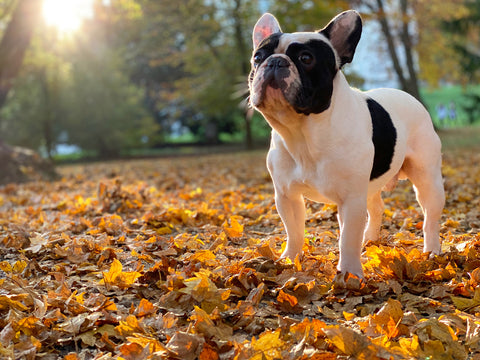Activity Level: Average
Hypoallergenic: No
Social Ability: Friendly & Playful
Skills: Hunting, Companionship
Intelligence: Above Average
Ideal Climate: Temperate, Cool
Professional cuddlers one and all, French Bulldogs are as impish as they are sweet. These pocket-size canines have a long history at the sides of the bourgeoisie, and today they remain among the top ten most popular breeds in the US.
Breed Overview
 Origin: French Bulldogs were bred from Bulldog, Ratter, and Mastiff stock in the early nineteenth century. These yet-nameless canines were referred to by the catch-all term Bulldog before their eventual deviation to France. Bullies of all stripes were born for catching small, fast prey, so they are surprisingly agile for their stocky stature. Despite this skill, their passive nature means they were not widely utilized for hunting or farm work. They would mostly lead comfortable and well-fed lives at the sides of aristocrats and noblemen across Europe, with the exception of fighting practices that wreaked havoc all over the world.
Origin: French Bulldogs were bred from Bulldog, Ratter, and Mastiff stock in the early nineteenth century. These yet-nameless canines were referred to by the catch-all term Bulldog before their eventual deviation to France. Bullies of all stripes were born for catching small, fast prey, so they are surprisingly agile for their stocky stature. Despite this skill, their passive nature means they were not widely utilized for hunting or farm work. They would mostly lead comfortable and well-fed lives at the sides of aristocrats and noblemen across Europe, with the exception of fighting practices that wreaked havoc all over the world.
Descended from Bulldogs, an outdated catch-all term for strong, wide-mouthed canines, Frenchies were used in English bullbaiting and dogfighting activities shortly after they first started being bred. It is there that the breed was given the name Bouledogue Francais, literally translating to ‘ball mastiff of France,’ and thus their story begins.
 History: French Bulldogs were shuttled off to France, specifically the booming city of Paris, in the mid-nineteenth century, where their friendly nature and adorably unique faces became iconic among the upper class. Once solidified as a coveted breed in France, Frenchies became a piece of high fashion, no less essential than the latest Chanel. Artists of the time Edgar Degas and Henri de Toulouse-Lautrec depicted the breed in several art pieces, showcasing their place in modern culture.
History: French Bulldogs were shuttled off to France, specifically the booming city of Paris, in the mid-nineteenth century, where their friendly nature and adorably unique faces became iconic among the upper class. Once solidified as a coveted breed in France, Frenchies became a piece of high fashion, no less essential than the latest Chanel. Artists of the time Edgar Degas and Henri de Toulouse-Lautrec depicted the breed in several art pieces, showcasing their place in modern culture.
Around this same time, breeding records were not kept the way they are now, so reliable sources are scant. However, we do know that Terrier stock was added to the myriad of genetics already present in Bulldog breeding, with the intent of developing specific “desirable” traits. Irresponsible breeders and breeding practices focused on these aesthetic traits more than the quality of life for the dog, leading to poor genetic diversity and increased risk for congenital diseases.
In 1885, the Frenchie was brought to the US where they would remain a fashionable companion pet, leading up to their admission into the Westminster Dog Show in 1896. In a later show, a judge would unintentionally set a hugely recognizable standard for the breed-- ‘rose ears,’ the term for upright, satellite-like ears. This iconic trait is still a major identifying factor for Frenchies and is a part of the breed standard. By 1905, French Bulldogs were officially recognized as a separate from their cousins the English Bulldogs. A year later, the breed was among the top ten most popular breeds in America.
 The 1900s were a roaring century for the Frenchie, as they were one of the most widely adopted companion dogs in numerous countries around the world. From dog shows to red carpets, these canines shine in the spotlight as they adore the attention and affection. From Andy Warhol to Carrie Fisher, countless celebrities and wealthy personalities kept Frenchies as pets over the years, solidifying their image as prestige companions.
The 1900s were a roaring century for the Frenchie, as they were one of the most widely adopted companion dogs in numerous countries around the world. From dog shows to red carpets, these canines shine in the spotlight as they adore the attention and affection. From Andy Warhol to Carrie Fisher, countless celebrities and wealthy personalities kept Frenchies as pets over the years, solidifying their image as prestige companions.
Nowadays, while they are a highly popular canine breed, Frenchies can be found in shelters and rescues because so many pet parents elect to buy a bred dog over adopting. Unfortunately, purebred dogs are often rife with inherited health issues and require gratuitous care. To help combat this and place Frenchies in homes, organizations such as the French Bulldog Rescue Network, Chicago French Bulldog Rescue, and SNORT Rescue are fighting back. Check out any of these organizations for more information about adopting a Frenchie near you.
Fun Frenchie Fact: In 2022, the hashtag #FrenchBulldog has over 4.7 million posts.
Breed Attributes
 Temperament: Frenchies are easily recognizable by their wide, silly grins, and their attitude reflects that smile perfectly. These easygoing dogs tend to be perfectly content to sit at your side most of the day, as long as they get their daily dose of outside time. Once they’re in the backyard, they’ll run themselves ragged sooner than you may think; it takes a lot of energy to run with short stubby legs. When they’re inside, Frenchies tend to be affectionate couch potatoes with a bubbly, energetic personality just under the surface. That is to say, one squeak of a dog toy may have them leaping off the couch, already ready to play.
Temperament: Frenchies are easily recognizable by their wide, silly grins, and their attitude reflects that smile perfectly. These easygoing dogs tend to be perfectly content to sit at your side most of the day, as long as they get their daily dose of outside time. Once they’re in the backyard, they’ll run themselves ragged sooner than you may think; it takes a lot of energy to run with short stubby legs. When they’re inside, Frenchies tend to be affectionate couch potatoes with a bubbly, energetic personality just under the surface. That is to say, one squeak of a dog toy may have them leaping off the couch, already ready to play.
Personality: As may be apparent from their long history as companions, a French Bulldog’s personality is just as positive as their cheerful face implies. Generally calm yet playful, this breed is great around other dogs, other animals, and children. Because of this affectionate nature, these dogs may experience separation anxiety when left alone. Interactive toys and even music can help combat dog anxiety, and crate training is a great option for pet parents who are gone all day.
Ideal Owner: You! Frenchies are sweet and loyal, not to mention adorable. They'll be your constant companion and playmate with boundless adoration for you.
Fur Care

Grooming: Classic to their Bulldog roots, Frenchie coats are short and smooth; a soft bristle brush can help keep skin healthy by stimulating blood flow and gently removing dead skin. Due to their predisposition to ocular concerns, it is common for Frenchies to experience tear-staining around their eyes; this can be addressed with a simple Tear Stain Wipe to help remove the stain.
From time to time, any pet’s fur can become dry, dull, or discolored for a variety of reasons—most of which are harmless. To help lift stains and brighten the coat, our French Bulldog Whitening Shampoo is gentle and effective. When all they need is a quick spray to refresh and moisturize, our French Bulldog Avocado Herbal Spray soothes and hydrates skin and imparts a fresh botanical scent.
A Frenchie’s skin folds and rolls may be cute, but they can harbor bacteria, debris, and allergens. For this reason, regular baths are essential. Groomer-quality dog shampoo is recommended for at-home grooming, such as our Tea Tree Oil Shampoo to cleanse the skin and banish irritants with a pet-safe astringent essential oil.
Shedding: Bulldogs shed moderately, which can be managed with regular brushing and bathing. Luckily, because their hair is short, a French Bulldog won’t have you clogging the vacuum with tufts of long fur. Veterinarians often recommend a fish oil supplement for dogs as a preventative measure, as its Omega 3 content nourishes the skin and coat from within before dermatological issues arise. Our French Bulldog Omega Fatty Acid Chews offer high-potency omegas for a nutritional boost every day.
Health
 Common Issues: As you may know, dogs with a history of inbreeding have significantly increased risk factors for serious health problems. While it is not possible to change the genetic pitfalls of the past, you can affect their future; be sure to give your Frenchie a healthy diet, plenty of exercise, and regular veterinarian visits to support their wellness throughout their life.
Common Issues: As you may know, dogs with a history of inbreeding have significantly increased risk factors for serious health problems. While it is not possible to change the genetic pitfalls of the past, you can affect their future; be sure to give your Frenchie a healthy diet, plenty of exercise, and regular veterinarian visits to support their wellness throughout their life.
Bulldogs of all kinds are predisposed to Brachycephalic Airway Obstructive Syndrome, a genetic abnormality involving their shortened snout and face, and Congenital Hemivertebrae, a spinal deformity that is often found with a simple x-ray. Both can be assessed by a veterinarian, and many dogs with these and similar conditions can live full lives with only slight modifications to their lifestyle.
This breed is very sensitive to heat, partly due to their shortened snouts inhibiting their panting ability. It is important to keep fresh water nearby and always keep your Frenchie near the AC in the summer. Also related to their snout size, French Bulldogs are known to snore, snort, and wheeze, which is typically harmless.
 Ear and eye infections are also common for these dogs, according to a recent UK study of over thirty-thousand dogs. Keeping their noses out of the trash and their paws out of the garden can help prevent these issues, and an otic cleanse such as our French Bulldog Ear Flush can keep ears fresh and free from invaders.
Ear and eye infections are also common for these dogs, according to a recent UK study of over thirty-thousand dogs. Keeping their noses out of the trash and their paws out of the garden can help prevent these issues, and an otic cleanse such as our French Bulldog Ear Flush can keep ears fresh and free from invaders.
Along with the aforementioned health concerns, Bulldogs are susceptible to Dental Disease, an oral health condition that may be preventable with at-home dental care. Our French Bulldog Dental Sticks are a great option to help remove plaque from teeth while your pet enjoys a tasty snack.
Every pet adoption is an undertaking of responsibility, some pets more than others. Before adding a dog to your family, keep in mind the potential for serious congenital health conditions and the care they will need from you. An examination from your veterinarian can provide a more accurate idea of your pet’s health.
 Nutrition: Canines of all breeds need high levels of protein in their diet, from quality sources such as fish, beef, poultry, and pork. Dogs may also eat small amounts of fresh foods such as broccoli, pumpkin, and carrots. What shouldn’t be a part of your pet’s diet is table scraps, including cooked bones; some foods intended for humans can cause digestive upset and even toxicity for dogs.
Nutrition: Canines of all breeds need high levels of protein in their diet, from quality sources such as fish, beef, poultry, and pork. Dogs may also eat small amounts of fresh foods such as broccoli, pumpkin, and carrots. What shouldn’t be a part of your pet’s diet is table scraps, including cooked bones; some foods intended for humans can cause digestive upset and even toxicity for dogs.
Veterinarians recommend giving your dog a canine multivitamin for their entire life to ensure they get their daily doses of vitamins and minerals. Commercial dog foods are often high in proteins but low in other essential nutrients; our French Bulldog Multi-Vitamin, Puppy Multivitamin, and Senior Multivitamin are all great options for a necessary nutritional boost at all stages of life. If you have a pickier Frenchie, we recommend our delicious and easy-to-chew French Bulldog Multivitamin Chews.
Lifespan: 10-12 years
Physical Activity
 Training: Eager to please, French Bulldog puppies are known to be highly trainable. Professional obedience training is recommended for all canines, and you may be able to teach your Frenchie a few tricks too. Treat-based reward training is a popular method, but it is important to monitor your dog’s treat consumption to avoid overfeeding.
Training: Eager to please, French Bulldog puppies are known to be highly trainable. Professional obedience training is recommended for all canines, and you may be able to teach your Frenchie a few tricks too. Treat-based reward training is a popular method, but it is important to monitor your dog’s treat consumption to avoid overfeeding.
Exercise: A Frenchie’s small but mighty size allows for speed and agility, but they’ll more likely use these skills to play than chase other animals. French Bullies are known to be very playful and friendly, even with strangers, so a trip to the dog park is always a good time. Thanks to their small size, one to two short play times throughout the day should be plenty to keep your pup physically active.
As Bulldogs, they are built for short bursts of high energy expenditure, so be sure to keep them hydrated and let them rest when they’re tuckered out. To support their joint health throughout their life, it is recommended to feed joint-nourishing compounds with a daily supplement such as our French Bulldog Z-Flex Hip and Joint Support. Each daily dose provides essential nutrients including Glucosamine and MSM, both of which are key in the joint tissue regeneration process.
Due to their front-heavy body structure and short legs, French Bulldogs cannot swim and should never be left unattended in or near water.
Any dog can become anxious or stressed when left alone or when couped up inside. To keep their mind active, veterinarian behaviorists recommend treat-hiding toys, snuffle mats, and automatic toys for every dog to help stave off boredom and pent-up energy.

French Bulldogs are as playful as they are cute, and they’ll keep closer than your shadow. From the dog park to the couch, they’ll be ecstatic just to be near you.

